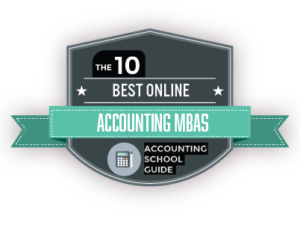 According to a recent article by Poets and Quants, job prospects have never been better for MBA graduates: in 2017, the Corporate Recruiters Survey Report found that 86% of companies across the globe plan to hire recent MBA graduates, up from 79% in 2016, which includes an uptick in every region and every industry. For specialty MBAs, the numbers are even better: specialized MBAs tend to command higher pay than general MBAs, and, perhaps unsurprisingly, the Finance and Accounting MBA places first, with a median salary of $120,000. Compare that to the Master of Accounting, with a median salary of $70,000, and you’ll see where we’re headed with this. The MBA remains the best all-around graduate degree in business, both in terms of application and ROI potential. For those particularly interested in an Accounting concentration, we’ve compiled the best online tracks below, which combine flexibility, affordability, and customization. Keep reading to find the program that best suits your needs!
According to a recent article by Poets and Quants, job prospects have never been better for MBA graduates: in 2017, the Corporate Recruiters Survey Report found that 86% of companies across the globe plan to hire recent MBA graduates, up from 79% in 2016, which includes an uptick in every region and every industry. For specialty MBAs, the numbers are even better: specialized MBAs tend to command higher pay than general MBAs, and, perhaps unsurprisingly, the Finance and Accounting MBA places first, with a median salary of $120,000. Compare that to the Master of Accounting, with a median salary of $70,000, and you’ll see where we’re headed with this. The MBA remains the best all-around graduate degree in business, both in terms of application and ROI potential. For those particularly interested in an Accounting concentration, we’ve compiled the best online tracks below, which combine flexibility, affordability, and customization. Keep reading to find the program that best suits your needs!
Methodology
- Program Cost (1/3): the total program costs. More affordable programs ranked higher.
- Admissions Strength (1/3): the admissions standards and acceptance rate of the program.
- Academic Prestige (1/3): traditional ranking metrics including class size, percentage of faculty with terminal degrees in their field, and retention rate.
1) University of North Alabama
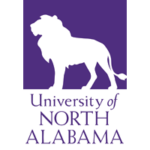
Founded in 1830, University of North Alabama has a total enrollment of 7,100 and is ranked among the top 35 public schools in the region by US News. The school’s 21:1 student-to-faculty supports a vibrant, collaborative educational setting that combines personalized instruction with peer-to-peer learning opportunities. Over 40% of classes have fewer than 20 students and just 4% have 50. As a signal for student satisfaction, UNA’s freshman rate is above 70%. For those interested in financial aid, undergraduate rates suggest a good record: 70% of full-time students receive some form of aid, and the average need met is over half.
One of the best programs in the state, North Alabama’s online MBA in Accounting consists of 34 hours, including Accounting Theory, Tax Accounting, Enterprise Systems Analysis and Design, Managerial Finance, Management Policy, and Marketing Strategy, among others. (Accounting course work is delivered in a hybrid format.) From there, students complete 6 hours of electives to tailor the degree toward areas of professional interest. Courses are designed to accommodate the schedules of working professionals, and all classes are taught by faculty with real-world business experience. The program is accredited by the AACSB. Applicants should have 3-5 years of work experience and/or acceptable GMAT scores.
- Tuition: $18,900
2) Gardner-Webb University

Founded in 1905, Gardner-Webb University has a total enrollment of 4,300, divided between undergraduates and graduates, and is ranked as a Tier 1 university by US News. The university’s 13:1 student-to-faculty ratio promotes an intimate, tight-knit learning community that emphasizes collaborative, individualized instruction. Nearly 70% of courses have less than 20 students — and none have 50. Gardner-Webb also has top-notch financial aid opportunities: 80% of undergrads receive some form of aid, and the average need met is over 75%. Finally, the university has expanded its distance education program in recent years to include 100% online, hybrid, and blended delivery options to accommodate students’ individual schedules and learning styles.
Gardner-Webb’s online MBA with an emphasis in Accounting features 36 credits. Core requirements include Managerial Accounting, Organizational Behavior, Entrepreneurial Management, Production Research and Operations Management, Business Law and Ethics, International Business, and a capstone in Strategic Management. In addition, students select electives to customize the track and complete a variety of project-based fulfillments like internships, service opportunities, course projects, course simulations, and more to gain real-world experience. Students on a standard full-time schedule can expect to complete the degree in two years. Applicants should submit GMAT scores and/or an undergraduate GPA.
- Homepage
- Tuition: $18,900
3) Culver-Stockton College
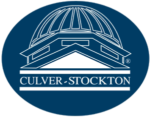
Culver-Stockton College, founded in 1853, is a private Christian institution in Missouri with a total enrollment of about 1,100. Ranked among the top 30 schools in the Midwest by US News, CSC’s dynamic educational approach emphasizes a rigorous curriculum, personalized academic advising, and enriching, hands-on experiences. The 15:1 student-to-faculty supports a tight-knit community that combines individualized instruction and collaborative learning; 60% of classes have fewer than 20 students and none have 50. For those interested in financial aid, undergraduate rates indicate a solid record: 80% of full-time students receive some form of aid, and the average need met is 75%.
Culver-Stockton offers an online MBA in Accounting and Finance that consists of 33 credits: among them, Global Marketing Strategy, Legal Environment, Managerial Accounting Decisions, Not For Profit Accounting and FinanceData Analysis for Decision Making, Taxation of Business Entities, and Global Strategy. All students also complete a capstone in Strategic Management. Designed for working professionals and adult learners, all courses are highly flexible to accommodate busy schedules and allow students to continue day-to-day responsibilities. In addition to advising, MBA students have access to career services, library resources, tech support, and more. Applicants should submit GMAT scores.
- Homepage
- Tuition: $14,220
4) Ashland University
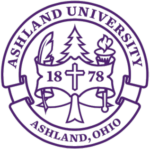
Founded in 1878, Ashland University is a private Christian institution in Ashland, Ohio, with a total enrollment of 5,700 and additional campuses in Cleveland, Columbus, Elyria, Massillon, Mansfield, and elsewhere. US News ranks Ashland a Tier 1 national university, with high marks from high school counselors, as well. Particular emphasis is placed on student-focused teaching, and the 14:1 student-to-faculty ratio keeps classes small, intimate, and personalized to individual needs. Nearly 60% of classes have fewer than 20 students and none have 50. As a marker of student satisfaction, the university’s freshman retention is 75%.
Ashland’s MBA is ranked a top-5 program in the state, and the 30-credit online track in Accounting includes an accelerated option that takes less than a year. Alternatively, students on a lower course load can take up to 3 years. Classes are designed to accommodate working professionals, and hybrid delivery is also available for maximum flexibility. The program’s core values are: competency-based education (meaning transfer credits may be offered to eligible students); student-centered, experiential learning; systematic stakeholder involvement and outcomes assessment; continuous program review and improvement; and additional learning via research, application, and service. Graduates of the program report a 46% increase in salary. It is accredited by the ACBSP.
- Homepage
- Tuition: $7,584
5) University of South Florida – St Petersburg

Founded in 1965, University of South Florida – St Petersburg has a total enrollment of 4,700, the majority of which consists of undergraduates. As a top 75 national university, US News also ranks St. Petersburg among the top 25 public schools in the region for its commitment to cutting-edge education, student-centered classes, and collaborative research efforts. The school’s 17:1 student-to-faculty allows it to balance the vibrant feel of a larger university with the close-knit learning community of a liberal arts school. A third of classes have fewer than 20 students and less than 9% have 50. 70% of full-time undergraduates receive some form of financial aid, with an average need met of about half.
USF St. Petersburg’s online MBA features 18 core credits and 18 elective credits from a variety of focus tracks, including Forensic Accounting. Core requirements are Financial Statement Analysis, Managerial Analysis, Leadership and Corporate Accountability, Regulatory and Reporting Environments, Global Business Environment, and Organizational Strategies for the 21st Century. From there, students interested can take Accounting classes like Business Valuations, Fraud Examination, Federal Taxation of Business Entities, Forensic Accounting & the Legal Environment, and Contemporary Issues in Taxation, among others. The program is designed for maximum flexibility, allowing students to progress at their own pace: full-time students can complete the degree in a year; part-time students can expect to finish in two years. GMAT or GRE scores are required unless the applicant qualifies for a waiver. For those interested, the university also offers an MBA/CPA track.
- Homepage
- Tuition: $16,632
6) Warner University

Warner University, founded in 1968, is a small Christian liberal arts school in Lake Wales, FL, with an enrollment of 1,200 students from 31 states and 27 countries. US News ranks the school among the top 50 regional colleges in the South, and WU ranks second in employment rates compared to the 30 other private colleges that make up the Independent Colleges & Universities of Florida. With its tight-knit 15:1 school-to-faculty ratio, classes maintain an intimate, personal feel, featuring tailored instruction and collaborative learning opportunities. Over half of classes have fewer than 20 students and none have 50. Note also that Warner’s online programs are primarily designed for working professionals and adult learners, averaging 37-years-old.
Warner’s online MBA in Accounting is a 36-credit track, which allows for three potential timelines in order to maintain maximum flexibility – 16 months, 24 months, or 3 years. (Students with previous academic credit may transfer into the program, further accelerating course work.) For those interested, Warner also offers concentrations in Human Resources, International Business, and Management. Classes start every two months.
- Homepage
- Tuition: $19,440
7) Creighton University

Founded in 1878, Creighton is a Jesuit university with a total enrollment of 8,500. US News ranks the university 1st in the Midwest region, with additional top marks for its veterans services, overall value, and innovation in education. Creighton’s trademark EDGE program offers a wide range of student services, including personalized academic advising, career planning, tutoring, and more. The 11:1 student-to-faculty ratio helps to maintain small, intimate classes and individualized instruction. Half of classes have fewer than 20 students and just 6% have 50. Best of all, 98% of Creighton alumni are employed or pursuing further studies 9 months after graduation.
One of the top-ranked business programs in the region, Creighton’s online MBA in Accounting consists of 33 credits. Core requirements include Leadership and Organizational Behavior and Business Policy And Managerial Action. From there, the bulk of the curriculum will focus on Accounting course work, plus electives to customize the track and a capstone in Strategic Management. For maximum flexibility, students can opt to complete the degree on a traditional 2-year timetable or accelerate completion time via hybrid delivery or increasing course loads. Applicants should submit GRE or GMAT scores. The program is accredited by the AACSB. Additional specializations include Investments, Information Technology Management, Leadership, Personal Financial Planning, and Financial Psychology & Behavioral Finance.
- Homepage
- Tuition: $11,700
8) Jacksonville State University

Jacksonville State University, founded in 1883, is a public comprehensive institution in Alabama with a total enrollment of 8,300. Ranked among the top overall universities in the nation, US News also ranks JSU 41st in the South among public schools. Its 18:1 student-to-faculty ratio creates a vibrant, collaborative educational atmosphere that is small enough to support one-on-one learning. Over 40% of classes have less than 20 students and just 6% have 50. For those interested in financial aid opportunities, JSU’s undergraduate rate shows a strong record: 88% of full-time students receive some form of tuition assistance.
Jacksonville State’s online MBA in Accounting consists of 33 credits, including Accounting Information Analysis, Quantitative Methods for Business Decisions, Business Policy & Strategy, International Business, Financial Management, and Business Leadership, among others. From there, the Accounting concentration is filled via electives and the concentration module, with classes like Financial Accounting, Advanced Income Tax Accounting, and Auditing. Internships and independent research credits are also available with permission from the MBA director. All courses are designed for maximum flexibility, featuring full- and part-time tracks, accelerated options, hybrid delivery models, and more. The standard degree completion time is 2 years. The program is accredited by the AACSB.
- Homepage
- Tuition: $19,440
9) Mississippi College
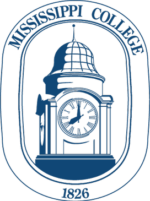
Mississippi College, founded in 1826, is a private Christian liberal arts school affiliated with the Mississippi Baptist Convention. With a total enrollment just over 5,000, US News ranks it among the top 30 colleges in the South, and in the top 25 for overall value and veteran services. Thanks to a 15:1 student-to-faculty ratio, students enjoy small, intimate classes that emphasize one-on-one instruction and collaborative and experiential learning opportunities. Nearly 60% of classes have less than 20 students and fewer than 2% have 50. As a Christian institution, all programs integrate religious values into the curriculum, and the school places an emphasis on the synthesis of faith, lifelong learning, and service. Admissions are rolling.
Mississippi College offers an MBA in Accounting totaling 30 credits. In addition to core requirements, students complete Federal Tax Accounting, Auditing Concepts & Applications, Accounting Theory, Advanced Accounting, and an elective to tailor the track to professional needs. Designed primarily for working professionals, the program maintains flexibility to accommodate unique scheduling demands and allow students to continue their professional responsibilities. Student services include tech support, library assistance, and a career center that boasts an excellent track record for job placement. Finance, Management Information Systems, and JD/MBA tracks are available, as well. The program is accredited by the AACSB.
- Homepage
- Tuition: $21,420
10) University of West Florida

Founded in 1963, University of West Florida has a total enrollment of 13,000, located just outside of downtown Pensacola. Forbes has listed UWF on its “America’s Best Colleges” and “Best Buy Colleges,” while Princeton Review and US News each rank it among the top schools in the region. With a 22:1 student-to-faculty ratio, UWF combines the vibrant, collaborative environment of a large research university with the small class sizes and one-on-one, student-centered approach of a liberal arts school. Over a third of classes have fewer than 20 students and just 11% have 50. For those interested in financial aid opportunities, West Florida boasts a strong undergraduate record: 65% of full-time students receive some form of assistance, and the average need met is about half.
West Florida’s online MBA with an emphasis in Accounting totals 36 credits: among them, Information Resources and Industry Analysis, Business Process Integration, Advanced Managerial Accounting, Financial Accounting, Corporate Tax, Strategic Management and Policy Formulation, and Advanced Auditing. Accelerated 7-week course delivery ensures working professionals maximum flexibility and allows students to complete the degree in as little as 16 months. More than half of the curriculum integrates experiential, applied learning to help build a personal portfolio of work and demonstrate mastery of material. Upon completion of the program, graduates will understand: the effect of economic, regulatory and tax policies on the business environment; accounting control structures, budget and performance evaluation, and accounting information systems; and accounting for governmental and nonprofit organizations. Entry dates are available three times per year.
- Homepage
- Tuition: $15,065
